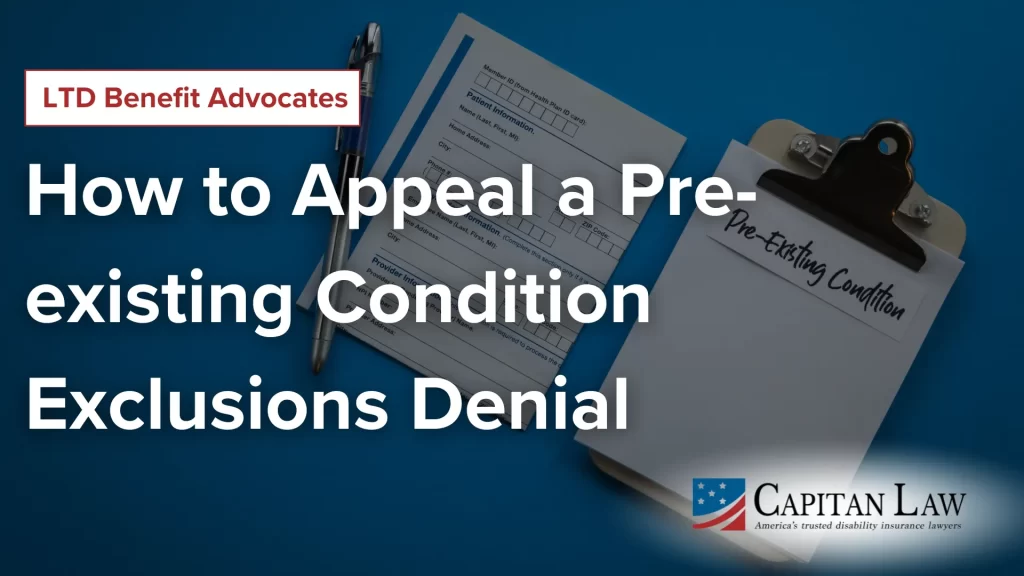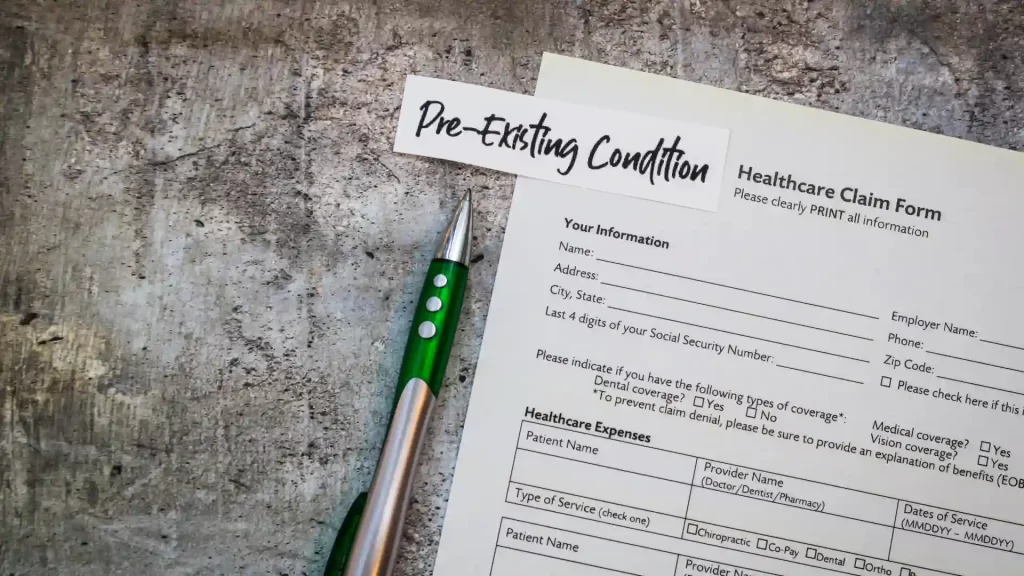Posted on Saturday, April 13th, 2024 at 1:39 am

Filing a disability insurance claim in Philadelphia, Pennsylvania, is a way to seek financial assistance when you can’t work. Disability insurance helps when illness or injury prevents you from working and earning an income. However, it’s important to be aware of pre-existing condition exclusions, which may affect your eligibility for benefits based on prior health issues.
However, insurance companies may look for reasons to deny claims. A policy’s pre-existing condition exclusions may determine whether the policy covers your condition.
What is a Pre-existing Condition Exclusions Denial in Pennsylvania?
What Qualifies as a Pre-Existing Condition for Disability in Pennsylvania?
Insurers have different policies regarding what conditions may justify pre-existing condition exclusions denials. However, all insurers in Pennsylvania have to obey the law when establishing policies.
A pre-existing condition may be one for which you received “medical advice or treatment” within 90 days of becoming covered under a policy. The 90-day period before coverage begins is called the “lookback period.”
For example, maybe you sustained an injury that you sought treatment for 50 days before your coverage began. If this injury worsens to the extent that you can’t work, the insurance company might have grounds to deny your claim.
Be aware that pre-existing conditions don’t qualify as such permanently. Under Pennsylvania law, a pre-existing condition no longer qualifies as pre-existing after you’ve been covered under a group contract for 12 months.
You may have the opportunity to disclose pre-existing conditions when signing up for coverage. Be honest when providing this information. Insurance companies sometimes won’t cover certain conditions if applicants don’t report them immediately.
Can Short-term Disability be Denied for Pre-Existing Conditions?
Seeking short-term disability with pre-existing conditions is no different from seeking long-term disability benefits in this regard. If an insurance company obeys the law, it can cite a pre-existing condition to deny a short-term disability claim.
Appealing Pre-Existing Condition Exclusions Denial in Pennsylvania
 The fact that the insurance company denied your claim doesn’t necessarily mean you can’t receive benefits. You could appeal their decision.
The fact that the insurance company denied your claim doesn’t necessarily mean you can’t receive benefits. You could appeal their decision.
The specific ways you may show you deserve benefits after a denial for a pre-existing condition can depend on the nature of your case. Potential arguments you might put forth include:
- The condition that caused your disability is not a pre-existing condition. Even if you have a pre-existing condition, an insurer might incorrectly conflate it with a new disability. Providing medical evidence could help you show that your disability results from a new condition.
- Case law establishes that an insurer should have offered coverage. Consider a recent case, Kaiser v. United of Omaha Life Ins. Co. In this case, the plaintiff had sought treatment for shoulder pain shortly before starting a new job. The doctor originally concluded the shoulder pain resulted from shoveling snow. Later, the plaintiff discovered they had a tumor. The insurance company denied their claim because they sought treatment for shoulder pain during the lookback period. However, a court found that seeking treatment for symptoms that end up being related to something more serious shouldn’t affect coverage of that serious condition. Cases like these establish a precedent you could reference when explaining why you deserve benefits.
- The insurance company is interpreting its own pre-existing condition exclusions too broadly. A careful review of a policy’s language could indicate that an insurer denied a claim when it should not have.
- The insurance company denied a claim for a disability partially stemming from a pre-existing condition, for example, in a case like Fought v. UNUM Life Ins. Co. of Am., an insurer, tried to deny a claim when a claimant developed a staph infection. The claimant developed this infection due to elective surgery they underwent during the lookback period. In this case, a court decided the policy’s language did not justify denying a claim in these circumstances.
Contact a Philadelphia, Pennsylvania, Disability Lawyer
An attorney can help in many ways when seeking disability benefits for a pre-existing condition. Examples include:
- Reviewing your policy’s terms to help you understand your coverage
- Assisting with the application process
- Helping with an appeal if you receive a pre-existing condition exclusions denial
At Capitan Law, a Philadelphia long-term disability appeals lawyer is available to help you seek the benefits you may be eligible to receive. Learn more about how we can help with your claim by contacting us online or at (267) 419-7888 for a case review.
Related Posts:
What Medical Conditions Are Eligible for Long Term Disability?
What Are the Different Types of Permanent Partial Disability?
Transitioning from Short Term to Long Term Disability
What Paperwork Do I Need From My Doctor For My Long Term Disability Claim?